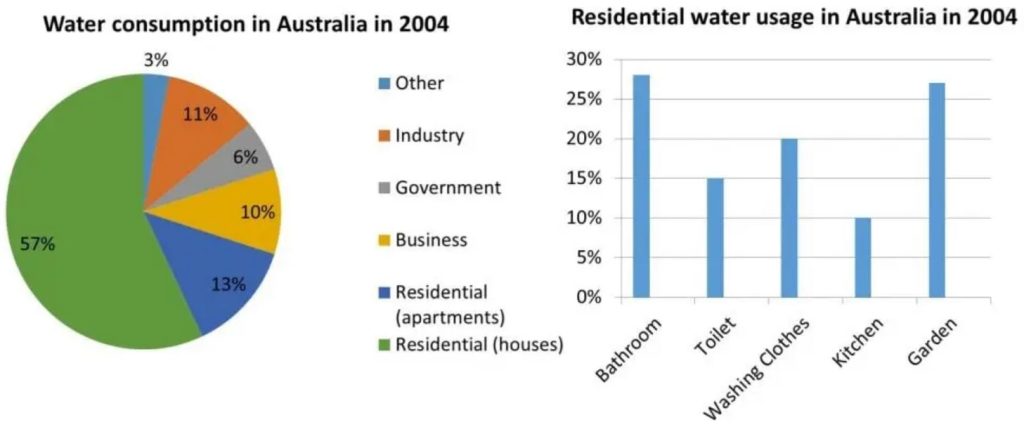Writing CD IELTS Iran Water consumption and use in Australia
16 شهریور 1403 1403-06-15 22:32Writing CD IELTS Iran Water consumption and use in Australia
IELTS Writing Task 1 & 2
CD IELTS Iran
Task 1: The pie and bar charts below show the percentage of water consumption and use in Australia in 2004.
Task 2: Many people put their personal information online (address, telephone number,credit card number…) for everyday activities such as socializing on social networks or banking purposes. Do you think it is a positive or negative development?

Arguments for Disagreement:
1. Privacy Risks: Sharing personal information online increases the risk of data breaches, hacking, and identity theft. Even reputable companies are susceptible to cyberattacks, making sensitive data vulnerable.
2. Loss of Control Over Personal Information: Once personal information is shared online, individuals often lose control over how it is used or stored. Data can be sold to third parties without users’ knowledge, leading to invasive targeted advertising or manipulation.
Arguments for Agreement:
1. Convenience and Efficiency: Putting personal information online streamlines daily tasks such as banking, shopping, and booking services, saving time and effort. People no longer need to visit physical stores or banks, making life more convenient.
2. Better Personalization of Services: With access to personal data, companies can provide tailored services, recommendations, and offers, improving user experience and customer satisfaction. This customization can make interactions more relevant and efficient.
Sample answer:
The increasing trend of individuals sharing their personal information online for activities such as social networking or banking is a topic of much debate. While the internet has become an essential tool for modern life, I believe that the widespread sharing of sensitive data online represents a largely negative development, despite some advantages.
One of the primary concerns is the risk of data breaches and cybercrime. With the growing sophistication of hackers, personal information stored online is more vulnerable to being accessed and misused. This can lead to identity theft, financial fraud, or even personal harm, especially if malicious entities gain access to sensitive details like home addresses or credit card numbers. For instance, the frequency of large-scale data breaches at major corporations demonstrates how even well-secured systems are not immune to attack.
Additionally, sharing personal information on social media can result in a loss of privacy. People often post without fully considering the long-term implications of making their data public. In some cases, personal details may be exploited by third parties for targeted advertising or even sold without the user’s consent. This commercialization of personal data can lead to individuals feeling like they no longer have control over their own information.
That said, there are some conveniences to sharing data online, such as the ease of managing finances or staying connected with friends and family. However, the potential dangers far outweigh these benefits. In conclusion, while the digital age demands a certain level of online engagement, the risks associated with sharing personal information online make it a predominantly negative development.







